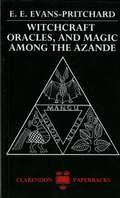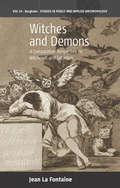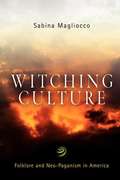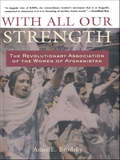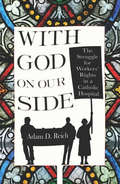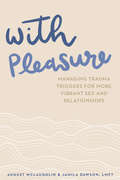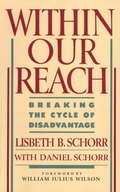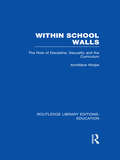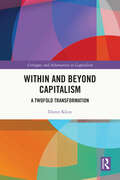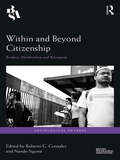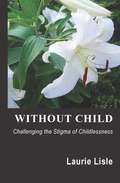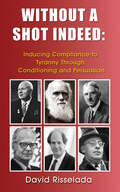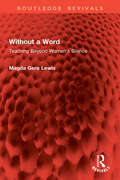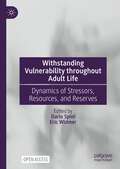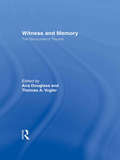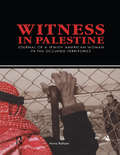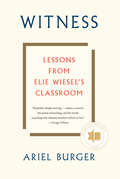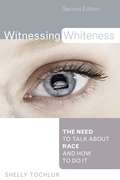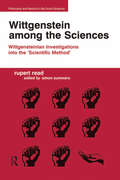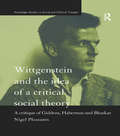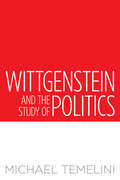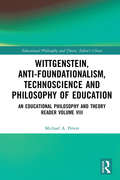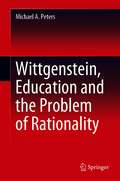- Table View
- List View
Witchcraft, Oracles and Magic Among the Azande (Abridged)
by Eva Gillies E. E. Evans-PritchardThis acknowledged masterpiece has been abridged to make it more accessible to students. In her introduction, Eva Gillies presents the case for the relevance of the book to modern anthropologists.
Witches and Demons: A Comparative Perspective on Witchcraft and Satanism
by Jean La FontaineDevil worship, black magic, and witchcraft have long captivated anthropologists as well as the general public. In this volume, Jean La Fontaine explores the intersection of expert and lay understandings of evil and the cultural forms that evil assumes. The chapters touch on public scares about devil-worship, misconceptions about human sacrifice and the use of body parts in healing practices, and mistaken accusations of children practicing witchcraft. Together, these cases demonstrate that comparison is a powerful method of cultural understanding, but warns of the dangers and mistaken conclusions that untrained ideas about other ways of life can lead to.
Witching Culture
by Sabina MaglioccoTaking the reader into the heart of one of the fastest-growing religious movements in North America, Sabina Magliocco reveals how the disciplines of anthropology and folklore were fundamental to the early development of Neo-Paganism and the revival of witchcraft. Magliocco examines the roots that this religious movement has in a Western spiritual tradition of mysticism disavowed by the Enlightenment. She explores, too, how modern Pagans and Witches are imaginatively reclaiming discarded practices and beliefs to create religions more in keeping with their personal experience of the world as sacred and filled with meaning. Neo-Pagan religions focus on experience, rather than belief, and many contemporary practitioners have had mystical experiences. They seek a context that normalizes them and creates in them new spiritual dimensions that involve change in ordinary consciousness.Magliocco analyzes magical practices and rituals of Neo-Paganism as art forms that reanimate the cosmos and stimulate the imagination of its practitioners. She discusses rituals that are put together using materials from a variety of cultural and historical sources, and examines the cultural politics surrounding the movement--how the Neo-Pagan movement creates identity by contrasting itself against the dominant culture and how it can be understood in the context of early twenty-first-century identity politics.Witching Culture is the first ethnography of this religious movement to focus specifically on the role of anthropology and folklore in its formation, on experiences that are central to its practice, and on what it reveals about identity and belief in twenty-first-century North America.
With All Our Strength: The Revolutionary Association of the Women of Afghanistan
by Anne E. BrodskyWith All Our Strength is the inside story of this women-led underground organization and their fight for the rights of Afghan women. Anne Brodsky, the first writer given in-depth access to visit and interview their members and operations in Afghanistan and Pakistan, shines light on the gruesome, often tragic, lives of Afghan women under some of the most brutal sexist oppression in the world.
With God On Our Side: The Struggle for Workers' Rights in a Catholic Hospital (The Culture and Politics of Health Care Work)
by Adam D. ReichWhen unions undertake labor organizing campaigns, they often do so from strong moral positions, contrasting workers' rights to decent pay or better working conditions with the more venal financial motives of management. But how does labor confront management when management itself has moral legitimacy? In With God on Our Side, Adam D. Reich tells the story of a five-year campaign to unionize Santa Rosa Memorial Hospital, a Catholic hospital in California. Based on his own work as a volunteer organizer with the Service Employees International Union (SEIU), Reich explores how both union leaders and hospital leaders sought to show they were upholding the Catholic "mission" of the hospital against a market represented by the other. Ultimately, workers and union leaders were able to reinterpret Catholic values in ways that supported their efforts to organize. More generally, Reich argues that unions must weave together economic and cultural power in order to ensure their continued relevancy in the postindustrial world. In addition to advocating for workers' economic interests, unions must engage with workers' emotional investments in their work, must contend with the kind of moral authority that Santa Rosa Hospital leaders exerted to dissuade workers from organizing, and must connect labor's project to broader conceptions of the public good.
With Pleasure: Managing Trauma Triggers for More Vibrant Sex and Relationships
by August McLaughlin Jamila DawsonA companion for anyone experiencing the effects of trauma, featuring true stories of survivors from a broad, inclusive range of backgroundsWith Pleasure: Managing Trauma Triggers for More Vibrant Sex and Relationships is a companion for anyone experiencing the effects of trauma. Through true survivor stories, expert insight, writing prompts, and grounding exercises, it explores pleasure, relationships, and community as worthy and essential antidotes in trying times. Written by trauma-informed sex therapist Jamila Dawson, LMFT, and sexuality journalist and podcaster August McLaughlin, With Pleasure provides a much-needed alternative to harmful "self-help" ideologies that instruct people to "change their thoughts" or "choose to be happy."Instead, Dawson and McLaughlin encourage readers to respect their feelings, understand the complexities of a society and systems that fuel trauma, foster self-compassion, and embrace pleasure.
Within Our Reach
by Lisbeth SchorrIn this solidly researched book, the authors demonstrate that the knowledge and techniques exist to decrease the incidence of welfare dependency, poor single-parent families and alienated, uneducated youth. In addition to providing a detailed account of the problem, they describe twenty-four programs that have proved successful in changing the lives of seriously disadvantaged children.From the Trade Paperback edition.
Within School Walls: The Role Of Discipline, Sexuality And The Curriculum (Routledge Library Editions: Education)
by AnnMarie WolpeDrawing from her in-depth ethnographic study of a London comprehensive school the author shows how gender formation for both girls and boys is mediated by disciplinary control, sexuality and the curriculum. Her findings for girls and boys – with their important emphases – are revealed. So are the responses and perspectives of the teachers. Prior to publication of this volume much feminist writing depicted the subordination of girls as a function of patriarchal control, both in terms of the teaching the girls receive and the behaviour of the boys around them. The author’s narrative implicitly and explicitly challenges some of these views.
Within and Beyond Capitalism: A Twofold Transformation (Critiques and Alternatives to Capitalism)
by Dieter KleinThis book argues for a twofold transformation to mitigate environmental catastrophe, avert war and overcome poverty and authoritarianism: a struggle for democratic, peace-oriented, social and ecological changes within the framework of a post-neoliberal, but still bourgeois-capitalist society, and a drive towards entry-level projects aimed at a great transformation beyond capitalism. Calling for the embrace of core values and institutions aligned with solidarity as opposed to capitalism, it advances four guiding ideas for the pursuit of such a path: redistribution of life chances and power, socio-ecological restructuring, redesign of democratic institutions, and reversal from confrontation to peace through international cooperation and solidarity. A presentation of the fundamental elements of a left strategy for socioecological transformation, this volume will appeal to scholars of social, political and economic theory with interests in post-capitalist futures.
Within and Beyond Citizenship: Borders, Membership and Belonging (Sociological Futures)
by Roberto G. Gonzales Nando SigonaWithin and Beyond Citizenship brings together cutting-edge research in sociology and social anthropology on the relationship between immigration status, rights and belonging in contemporary societies of immigration. It offers new insights into the ways in which political membership is experienced, spatially and bureaucratically constructed, and actively negotiated and contested in the everyday lives of citizens and non-citizens. Themes, concepts and ideas covered include: The shifting position of the non-citizen in contemporary immigration societies; The intersection of human mobility, immigration control and articulations of citizenship; Activism and everyday practices of membership and belonging; Tension in policy and practice between coexisting traditions and regimes of rights; Mixed status families, belonging and citizenship; The ways in which immigration status (or its absence) intersects with social cleavages such as age, class, gender and ‘race’ to shape social relations. This book will appeal to academics and practitioners working in the disciplines of Social and Political Anthropology, Sociology, Social Policy, Human Geography, Political Sciences, Citizenship Studies and Migration Studies.
Without Child
by Laurie LisleWithout Child challenges the stigma of childlessness by offering childless women the lifeaffirming story of themselves. Beginning with the difficult inner journey a woman faces before finally deciding or realizing she will not bear children, Without Child explores the myth of the childless woman's rejection of the maternal instinct. It also examines the childless woman's relationship to mothers and mothering, to her femininity, to men, to achievement, to her body,and to old age.Laurie Lisle contends that childless women are part of an ancient and respectable cultural tradition that includes biblical matriarchs, celibate saints, and nineteenth-century social reformers. However, like other aspects of women's history, this tradition has been forgotten and, in the process, maligned. Without Child bring childless women out of obscurity and places them back in women's history.Without Child brings scope and depth to a subject that has long been misunderstood. Weaving rich materials from history, literature, religion, and sociology with the author's own and other stories, this groundbreaking book does what no other has done before-presents childlessnessin a multifaceted and positive light.Most women grow up thinking they will become mothers, and many do follow that path. But for those women who are willingly or unwillingly without children, childlessness is a way of life that many of them must constantly defend. Without Child explores the facts and fallacies behind childlessness,what it means for women and society, and reminds us of how women can and do embrace this choice.In the shadow of a culture that claims to adore the child, Without Child bring a long forbidden topic into the light. Wide-ranging, yet intimate, philosophical, yet clear~sighted, this important book will reassure millions of women that they are not alone, not unusual, and, in fact, are part of a long and honorable tradition.Laurie Lisle is the author of four other books besidesWithout Child: two biographies of women artists, a history of a girls'school, and a memoir from the point-of-view as a gardener. Raised in Rhode Island, she lives with her husband in Litchfield County,Connecticut and in Westchester County, New York. For more information, please see her website at www.laurielisle.com.
Without a Badge: Undercover in the World's Deadliest Criminal Organization
by Jerry Speziale Mark SealTrue story of an undercover cop.
Without a Shot Indeed: Inducing Compliance to Tyranny Through Conditioning and Persuasion
by David RisseladaNikita Khrushchev proudly proclaimed the United States would one day awaken as a full-blown communist country. Americans are gullible, he said, the United States will be defeated without firing a shot. What did he mean by this? This book will attempt to answer this question by examining the social sciences used to study our behavior for the purpose of manipulating and changing it. The theories of B.F. Skinner, Cass Sunstein and others will be looked at along with scientific models from which our behavior is examined. Persuasive communication strategies designed to gain compliance will also be explored along with what is understood about the human reaction to fear. Without a Shot Indeed: Inducing Compliance to Tyranny will expose the reader to the reality that our behaviors, beliefs and attitudes are constantly under the microscope and the target of those seeking to change our nation.
Without a Word: Teaching Beyond Women's Silence (Routledge Revivals)
by Magda Gere LewisThe question of women’s silence within academic settings has received a great deal of attention. And much feminist educational scholarship has devoted itself to creating spaces where women’s stories and experiences can be told. Without a Word (first published in 1993) raises the question of women’s silence from a radical new perspective, lending at long last a theoretical basis and sophistication to this important issue.The author considers the subject of silence from a variety of conceptual and practical perspectives. When does silene occur among women? How does it emerge? What are its complex origins? What are its devastating effects? Lewis also discusses the different types of silence: the one which is an expression of a woman’s oppression and the one which is her act of revolt.Actual classroom interactions, student experiences, literary and filmic depictions of women, and her own personal voice are the material from which Lewis crafts her powerful theory. Intended to offer an understanding of the subject which can help feminists and teachers struggling to change the nature and dynamics of classroom experience for all students, Without a Word dramatizes the issue of silence in a way that moves beyond the mere need for women to speak and be heard. This book is a must read for students and researchers of education, feminist studies, women studies, and sociology.
Withstanding Vulnerability throughout Adult Life: Dynamics of Stressors, Resources, and Reserves
by Dario Spini Eric WidmerThis open access interdisciplinary book integrates the major findings and theoretical advances of a 12-year research program run by the Swiss National Centre of Competence in Research LIVES research program hosted by the universities of Lausanne and Geneva, within a single comprehensive and coherent publication on vulnerability across adulthood. The book is based on the idea that vulnerability is an essential component of the life course that can inform how we use our resources, reserves and cope with stressors across the life course. It provides a unique interdisciplinary research framework based on the idea that vulnerability is a complex and dynamic process that can only be approached through a multidimensional, multilevel, and multidirectional perspective.This is an invaluable new resource for students and researchers in life course studies, and those from other disciplines willing to include life course factors in their research on vulnerability issues.
Witness Of Combines
by Kent MeyersWhen Kent Meyers was sixteen years old, his father died of a stroke. There was corn to plant, cattle to feed, and a farm to maintain. Here, in a fresh and vibrant voice, Meyers recounts the wake of his father&’s death and reflects on families, farms, and rural life in the Midwest.Meyers tells the story of growing up on the farm, from the joys of playing in the hayloft as a boy to the steady pattern of chores. He describes the power of winter prairie winds, the excitement of building a fort in the woods, and the self-respect that comes from canning 120 quarts of tomatoes grown on your own land.Meyers&’s father is the central figure around whom these memories revolve. After his father&’s death, Meyers fills his shoes out of necessity and respect. In doing so, he discovers that his father was a great teacher and that he himself is no longer a boy but a man. Perhaps the most moving passages of The Witness of Combines acknowledge the simultaneous sadness and pride of growing up in response to death. Meyers recalls planting and harvesting the last crop, selling the family farm, and other emotional moments in a testament to his father, the family bond, and the value of hard work.
Witness and Memory: The Discourse of Trauma
by Ana Douglass Thomas A. VoglerThis is a collection within the anthropology of violence and witness studies, a discipline inaugurated in the 1980s. It accomplishes a tight focus while tackling seemingly disparate topics: from Rigoberat Menchu to O.J. Simpson, and from feminist poetry to Hiroshima Mon Amour. With approaches ranging from anthropological and historical to literary and philosophical, this collection is engaging in both subject matter and writing style.
Witness in Palestine: A Jewish Woman in the Occupied Territories
by Anna BaltzerAnna Baltzer, a young Jewish American, went to the West Bank to discover the realities of daily life for Palestinians under the occupation. What she found would change her outlook on the conflict forever. She wrote this book to give voice to the stories of the people who welcomed her with open arms as their lives crumbled around them. For five months, Baltzer lived and worked with farmers, Palestinian and Israeli activists, and the families of political prisoners, traveling with them across endless checkpoints and roadblocks to reach hospitals, universities, and olive groves. Baltzer witnessed firsthand the environmental devastation brought on by expanding settlements and outposts and the destruction wrought by Israel's "Security Fence," which separates many families from each other, their communities, their land, and basic human services. What emerges from Baltzer's journal is not a sensationalist tale of suicide bombers and conspiracies, but a compelling and inspiring description of the trials of daily life under the occupation.
Witness: Lessons from Elie Wiesel's Classroom
by Ariel BurgerWINNER OF THE NATIONAL JEWISH BOOK AWARD—BIOGRAPHY Elie Wiesel was a towering presence on the world stage—a Nobel laureate, activist, adviser to world leaders, and the author of more than forty books, including the Oprah’s Book Club selection Night. But when asked, Wiesel always said, “I am a teacher first.” In fact, he taught at Boston University for nearly four decades, and with this book, Ariel Burger—devoted protégé, apprentice, and friend—takes us into the sacred space of Wiesel’s classroom. There, Wiesel challenged his students to explore moral complexity and to resist the dangerous lure of absolutes. In bringing together never-before-recounted moments between Wiesel and his students, Witness serves as a moral education in and of itself—a primer on educating against indifference, on the urgency of memory and individual responsibility, and on the role of literature, music, and art in making the world a more compassionate place. Burger first met Wiesel at age fifteen; he became his student in his twenties, and his teaching assistant in his thirties. In this profoundly thought-provoking and inspiring book, Burger gives us a front-row seat to Wiesel’s remarkable exchanges in and out of the classroom, and chronicles the intimate conversations between these two men over the decades as Burger sought counsel on matters of intellect, spirituality, and faith, while navigating his own personal journey from boyhood to manhood, from student and assistant, to rabbi and, in time, teacher. “Listening to a witness makes you a witness,” said Wiesel. Ariel Burger’s book is an invitation to every reader to become Wiesel’s student, and witness.
Witnessing Whiteness: The Need to Talk About Race and How to Do It (Second Edition)
by Shelly TochlukWitnessing Whiteness invites readers to consider what it means to be white, describes and critiques strategies used to avoid race issues, and identifies the detrimental effect of avoiding race on cross-race collaborations. The author illustrates how racial discomfort leads white people toward poor relationships with people of color. Questioning the implications our history has for personal lives and social institutions, the book considers political, economic, socio-cultural, and legal histories that shaped the meanings associated with whiteness. Drawing on dialogue with well-known figures within education, race, and multicultural work, the book offers intimate, personal stories of cross-race friendships that address both how a deep understanding of whiteness supports cross-race collaboration and the long-term nature of the work of excising racism from the deep psyche. Concluding chapters offer practical information on building knowledge, skills, capacities, and communities that support anti-racism practices, a hopeful look at our collective future, and a discussion of how to create a culture of witnesses who support allies for social and racial justice.
Wittgenstein among the Sciences: Wittgensteinian Investigations into the 'Scientific Method' (Philosophy and Method in the Social Sciences)
by Rupert Read Edited by SummersEngaging with the question of the extent to which the so-called human, economic or social sciences are actually sciences, this book moves away from the search for a criterion or definition that will allow us to sharply distinguish the scientific from the non-scientific. Instead, the book favours the pursuit of clarity with regard to the various enterprises undertaken by human beings, with a view to dissolving the felt need for such a demarcation. In other words, Read pursues a 'therapeutic' approach to the issue of the status and nature of these subjects. Discussing the work of Kuhn, Winch and Wittgenstein in relation to fundamental question of methodology, 'Wittgenstein among the Sciences' undertakes an examination of the nature of (natural) science itself, in the light of which a series of successive cases of putatively scientific disciplines are analysed. A novel and significant contribution to social science methodology and the philosophy of science and 'the human sciences', this book will be of interest to social scientists and philosophers, as well as to psychiatrists, economists and cognitive scientists.
Wittgenstein and the Idea of a Critical Social Theory: A Critique of Giddens, Habermas and Bhaskar (Routledge Studies in Social and Political Thought #Vol. 15)
by Nigel PleasantsThis book uses the philosophy of Wittgenstein as a perspective from which to challenge the very idea of critical social theory, represented preeminently by Giddens, Habermas and Bhaskar. Renouncing the quest for an alternative Wittgensteinian theory of social and political life, the author shows that Wittgenstein nevertheless has considerable significance for critical thought and practice.
Wittgenstein and the Study of Politics
by Michael TemeliniIn Wittgenstein and the Study of Politics, Michael Temelini outlines an innovative new approach to understanding the political implications of Wittgenstein's philosophy. Most political philosophers who have approached Wittgenstein have done so through the idea of therapeutic skepticism, implying politics that privilege conservatism or non-interference. Temelini interprets Wittgenstein differently, emphasizing his view that we come to understand the meanings of words and actions through a dialogue of comparison with other cases. Examining the work of Charles Taylor, Quentin Skinner, and James Tully, Temelini highlights the ways in which all three, despite their differences, share a common debt to that dialogical approach.A cogent explanation of how Wittgenstein's epistemology and ontology can shed light on political issues and offer a solution to political challenges, Wittgenstein and the Study of Politics highlights the importance of Wittgensteinian thinking in contemporary political science, political theory, and political philosophy.
Wittgenstein, Anti-foundationalism, Technoscience and Philosophy of Education: An Educational Philosophy and Theory Reader Volume VIII (Educational Philosophy and Theory: Editor’s Choice)
by Michael A. PetersThis book is a collection of essays motivated by a "cultural" and biographical reading of Wittgenstein. It includes some new essays and some that were originally published in Educational Philosophy and Theory. The book focuses on the concept of “technoscience”, and the relevance of Wittgenstein’s work for philosophy of technology which amplifies Lyotard’s reading and provides a critique of education as an increasingly technology-led enterprise. It includes a distinctive view on the ethics of reading Wittgenstein and the ethics of suicide that shaped him. It also examines the reception and engagement with Wittgenstein’s work in French philosophy with a chapter on post-analytic philosophy of education as a choice between Richard Rorty and Jean-François Lyotard. Peters examines Wittgenstein’s academic life at Cambridge University and his involvement as a student and faculty member in the Moral Sciences Club. Finally, the book provides an understanding of Wittgensteinian styles of reasoning and the concept of worldview. Is it possible to escape the picture that holds us captive? This constitutes a challenging introduction to Wittgenstein’s work for academics, researchers and postgraduate students in the fields of education, technology and philosophy.
Wittgenstein, Education and the Problem of Rationality
by Michael A. PetersThis book develops an argument for a historicist and non-foundationalist notion of rationality based on an interpretation of Wittgenstein of the Philosophical Investigations and On Certainty. The book examines two notions of rationality—a universal versus a constitutive conception – and their significance for educational theory. The former advanced by analytic philosophy of education as a form of conceptual analysis is based on a mistaken reading of Wittgenstein. Analytic philosophy of education used a reading of Wittgenstein’s philosophy of language to set up and justify an absolute, universal and ahistorical notion of rationality. By contrast, the book examines the underlying influence of the later Wittgenstein on the historicist turn in philosophy of science as a basis for a non-foundationalist and constitutive notion of rationality which is both historical and cultural, and remains consistent with wider developments in philosophy, hermeneutics and social theory. This book aims to understand the philosophical motivation behind this view, to examine its intellectual underpinnings and to substitute this universal conception of rationality by reference to a Hegelian interpretation of the later Wittgenstein that emphasizes his status as an anti-foundational thinker.
